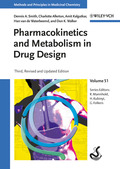Pharmacokinetics and Metabolism in Drug Design
Methods and Principles in Medicinal Chemistry (Series Nr. 51)

3. Edition April 2012
X, 258 Pages, Hardcover
169 Pictures
23 tables
Monograph
Short Description
A concise introduction to the parameters and processes governing the absorption, distribution and retention of drug compounds in the body, now expanded to cover prodrugs, antitumor drugs and predictive approaches.
Buy now
Price: 139,00 €
Price incl. VAT, excl. Shipping
Euro prices for Wiley-VCH and Ernst & Sohn titles are only valid for Germany. In EU countries, local VAT applies. Postage will be charged.
In this new edition of a bestseller, all the contents have been brought upto-date by addressing current standards and best practices in the assessment and prediction of ADMET properties. Although the previous chapter layout has been retained, substantial revisions have been made, with new topics such as pro-drugs, active metabolites and transporters covered in detail in a manner useful to the Drug Discovery scientist. The authors discuss the parameters and processes important for the absorption, distribution and retention of drug compounds in the body, plus the potential problems created by their transformation into toxic byproducts.
While aimed at all those dealing professionally with the development and application of pharmaceutical substances, the readily comprehensible style makes this book equally suitable for students of pharmacy and related subjects. Uniquely comprehensive, the book relates physicochemistry and chemical structure to pharmacokinetic properties and ultimately drug efficacy and safety.
Physicochemistry and Pharmacokinetics
Partition and Distribution Coefficients as Measures of Lipophilicity
Limitations on the Use of 1-Octanol
Further Understanding of logP
Alternative Lipophilicity Scales
Computational Systems to Determine Lipophilicity
Membrane Systems to Study Drug Behavior
Dissolution and Solubility
The BCS Classification and Central Role of Permeability
PHARMACOKINETICS
Setting the Scene
Intravenous Administration: Volume of Distribution
Intravenous Administration: Clearance
Intravenous Administration: Clearance and Half-life
Intravenous Administration: Infusion
Oral Administration
Repeated Doses
Development of the Unbound (Free) Drug Model
Unbound Drug and Drug Action
Unbound Drug Model and Barriers to Equilibrium
Pharmacodynamic Models
Slow Offset Compounds
Factors Governing Unbound Drug Concentration
ABSORPTION
The Absorption Process
Dissolution
Membrane Transfer
Barriers to Membrane Transfer
Prodrugs to Increase Oral Absorption
Active Transport
Models for Absorption Estimation
Estimation of Absorption Potential and other Computational
DISTRIBUTION
Membrane Transfer Access to the Target
Brain Penetration
CLEARANCE
The Clearance Processes
Role of Transport Proteins in Drug Clearance
Interplay Between Metabolic and Renal Clearance
Role of Lipophilicity in Drug Clearance
Active Metabolites
Balancing the Rate of Renal and Metabolic clearance and Potency
RENAL CLEARANCE
Kidney Anatomy and Function
Lipophilicity and Reabsorption by the Kidney
Effect of Charge on Renal Clearance
Plasma Protein Binding and Renal Clearance
Balancing Renal Clearance and Absorption
Renal Clearance and Drug Design
METABOLIC (HEPATIC) CLEARANCE
Symbols
Function of Metabolism (Biotransformation)
Cytochrome P450
Other Oxidative Metabolism Processes
Oxidative Metabolism and Drug Design
Nonspecific Esterases
Prodrugs to Aid Membrane Transfer
Enzymes Catalyzing Drug Conjugation
Stability to Conjugation Processes
Pharmacodynamics and Conjugation
TOXICITY
Toxicity Findings
Structure - Toxicity Analyses
Reactive Metabolite Screening in Drug Discovery
Structural Alerts/Toxicophores in Drug Design
Dealing with Reactive Metabolite Positives in Drug Discovery: Risk Assessment Strategies - Effect of Daily Dose
Dealing with Reactive Metabolite Positives in Drug Discovery: Risk Assessment Strategies - Competing Detoxication Pathways
Stratification of Toxicity
Toxicity Prediction: Computational Toxicology
Toxicogenomics
Pharmacogenomics
Enzyme Induction and Drug Design
Enzyme Inhibition and Drug Design
PREDICTING HUMAN PHARMACOKINETICS
Objectives of Predicting Human Pharmacokinetics
Allometric Scaling of Preclinical In Vivo PK Parameters
Prediction of Human PK Parameters Using In Vitro Data
Elimination Half-Life
Moving Forward
ADME SCREENING
The High-Throughput Synthesis and Screening Trend
The Concept of ADME Space
Drug Metabolism and Discovery Screening Sequences
Physicochemistry
Absorption/Permeability
Metabolism, Induction, and Inhibition
Transporters
Protein Binding
Pharmacokinetics
(Visiting Professor, University of Liverpool ) and in an advisory capacity. His research interests and publications span all aspects of drug discovery and development, particularly where drug metabolism impacts on the design of more efficacious and safer drugs.
Charlotte Allerton obtained her first degree in chemistry from the University of Nottingham, and a MPhil in organic chemistry from the University of Cambridge. She joined the Medicinal Chemistry department in Pfizer at Sandwich in 1993 and worked across a range of disease areas, before joining the Pharmacokinetics, Dynamics and Metabolism (PDM) department in 2007. In 2008 Charlotte Allerton became the PDM Sandwich Site Lead.
Amit Kalgutkar received his PhD in organic chemistry from Virginia Polytechnic Institute (USA) and conducted a post-doctoral fellowship at the Department of Biochemistry, Vanderbilt University School of Medicine. He joined Pfizer in 1999, where he is currently a Research Fellow in the Drug Metabolism Group (Groton Laboratories). He is also an adjunct Professor in the Department of Biomedical and Pharmaceutical Sciences, University of Rhode Island.
Han van de Waterbeemd studied physical organic chemistry at the Technical University of Eindhoven and did a PhD in medicinal chemistry at the University of Leiden, The Netherlands. In his pharmaceutical career he worked for Roche, Pfizer and AstraZeneca. His research interests include the role of molecular properties in drug disposition and computational modeling of ADMET properties.
DonWalker obtained a degree in biochemistry from the University of London (UK). He worked for Pfizer for 24 years in the Pharmacokinetics, Dynamics and Metabolism Department contributing scientific leadership to the drug metabolism and pharmacokinetic evaluations on many drug discovery and development projects across a range of therapeutic areas including cardiovascular, allergy and respiratory, anti-infectives and sexual health. Following his retirement in 2010 he has continued to provide occasional consulting and lecturing in the field of metabolism and pharmacokinetics.


